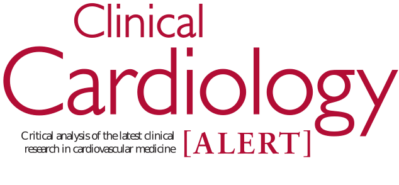
Clinical Cardiology Alert – March 1, 2015
March 1, 2015
View Issues
-
Intravenous Fluids in Patients With Acute Heart Failure
MONOGRAPH: Volume overload is a hallmark of acute heart failure. In hospitalized patients, intravenous loop diuretics are the most common treatment for decongestion.
-
Bridging During Anticoagulation Interruptions Is Associated with Worse Outcomes
Despite the routine nature of discontinuing atrial fibrillation (AF) patients’ long-term oral anticoagulation (OAC) for procedures and “bridging” them with another agent, there is remarkably little data on the safety and benefit of this practice. Guidelines detailing when and how to initiate bridging therapy have been published, but data supporting why we should bridge at all are limited.1 To help fill this void, Steinberg and colleagues used a national, community-based registry of outpatients with AF (ORBIT-AF) to examine current practices around periprocedural OAC management and associated outcomes. Outcomes evaluated included rates of major bleeding, as well as myocardial infarction, stroke or systemic embolism, cause-specific hospitalization, and death within 30 days.
-
Surgical Management of Infective Endocarditis
SOURCES: Chu VH, et al. Association between surgical indications, operative risk, and clinical outcome in infective endocarditis: A prospective study from the international collaboration on endocarditis. Circulation 2015;131:131-140; Erbel R. The new strategy in infective endocarditis: Early surgery based on early diagnosis: Are we too late when early surgery is best? Circulation 2015;131:121-123. -
Implantable Coronary Sinus Narrowing Device Shows Promise in Refractory Angina
Despite advances in medical therapy and in coronary revascularization techniques, the population of patients with chronic, stable, but debilitating angina continues to grow. The mortality of such patients is surprisingly low, such that patients with this disorder often suffer limiting symptoms for many years. Clearly more options for treatment are needed, but what?
-
Ticagrelor Cost Effective as Well as Efficacious, According to New Analysis
The PLATO trial randomized more than 18,000 acute coronary syndrome (ACS) patients to dual anti-platelet therapy with aspirin plus either clopidogrel or the newer P2Y12 inhibitor ticagrelor. Compared with clopidogrel-treated patients, those on ticagrelor had lower rates of death and myocardial infarction at 1 year. Despite superior ischemic outcomes, both ticagrelor and the thienopyridine prasugrel have been relatively slow to be adopted in the United States. This is at least in part due to the cost differential, as the older clopidogrel is available as a generic, while the newer agents enjoy continued brand exclusivity. The National Average Drug Acquisition Cost data collected by CMS currently reports a 70-fold difference in price between clopidogrel and ticagrelor.
